A 12-day trip in Cambodia brings clean water – and some insights on short-term mission trips
Listen to our podcast
Constructing a community BioSand filter — one of many in Cambodia. PHOTO: KAREN STILLER
Terri Wiebe, a nurse from Steinbach, Man., crouches on the ground beside a little boy who shows up each day at our camp in Banteay Meanchey Province in northern Cambodia.
His legs and bare behind are covered in sores and scars. Wiebe gently wipes down his legs and feet with wipes and water from a plastic drinking bottle.
This little guy seems to be mostly cared for by an older sister and brother who watch curiously as their brother is tended to. Most likely, his parents are off working in Thailand or as day labourers in someone else’s rice fields.
It was Jayden Jones, a 28-year-old firefighter from Fort MacKay, Alta., who called her over to look at a fresh cut on the little boy’s foot.
Other members of our Water for Kids team, in Cambodia for a 12-day visit with Samaritan’s Purse Canada, gather around.
This boy has won our hearts through his lollygagging ways, including lounging naked on our picnic table, and his curiosity about the foreigners in his midst.
If we can do something, anything, for him, we want to. We offer our nurse friend body wash, soap, wipes – our desire to solve this one problem in front of us is palpable.
She declines a Band-Aid. "It would be nice to cover it, but I’ll clean it up and send them home with soap," she says. "Putting a Band-Aid on this is not a good solution."
This is not a Band-Aid
We are here, ten of us ranging in age from 18 to 61, from one end of Canada to another, to help build water filters for three rural schools. We’re also installing individual household BioSand filters for families who have either paid a small price or volunteered a day’s labour to receive one.
If these three kids before us are like most people in this rural area, they do not have access to a dependable source of clean water.
They are at high risk of becoming a number in the awful statistics we hear back in Canada all the time. Every 24 seconds someone – often a child – dies of a water-related illness. The World Health Organization estimates inadequate drinking water, sanitation and hygiene cause 842,000 diarrheal disease deaths per year.
In fact we meet a family just a few moments down the road who lost a two-year-old granddaughter a few years ago from diarrhea that just wouldn’t go away. Her surviving brother attends one of the schools receiving a filter during this trip.
Samaritan’s Purse has built large filters for 80 schools in Cambodia so far and installed more than 20,700 BioSand filters in the simple, sturdy homes that dot the countryside.
Their Cambodian staff and workers install the vast majority of the filters each year, but Samaritan’s Purse also brings teams from Canada to pay for and build filters – 15 this year alone. We are one of those teams.
Each member of this team paid $1,000 above their other costs to pay for the filters we will piece together on prepared concrete pads under a sun that melts us like wax. The children who attend the schools will have steady access to clean water, most likely for the first time in their lives.
The water is clear, but short-term mission trips can be murky
Years ago, as our church prepared to go on a short-term trip to Honduras, a friend told me it would be better if it was not called a mission trip – because we were so excited about going. She couldn’t seem to reconcile the co-existence of our pleasure and the idea of sacrifice in another culture that she associated with a mission trip.
Her comment stayed with me. As a minister’s wife, I am familiar with serving and not always enjoying it. I do not believe it is nobler to be miserable. It’s just more unpleasant. I’ve always thought that I benefitted greatly from mission trips I was on. And to be honest, I never really thought there was anything wrong with that.
These thoughts came back to me recently when a friend’s Facebook post kick-started a dialogue about whether short-term mission trips are an outdated idea, even harmful. At the very least they should be called something different, went the thread of the discussion, to acknowledge that those who go to the foreign country benefit as much if not more than those they visit.
My Cambodia trip was only weeks away, so I waded into the discussion tentatively, knowing that soon enough I would be posting an unending (and now I suspected annoying) series of shots of beautiful children, water filters and jolting tuk tuk rides through Siem Reap.
People posted that the trips tend to be more about self-discovery than selflessness. A mission to Me. And that people should send the money they spend on their travel to the destination and ministry directly, rather than going there themselves to be a two-week work project for their hosts.
Skeptical me questioned if we are generous enough to do that. But I took those questions with me.
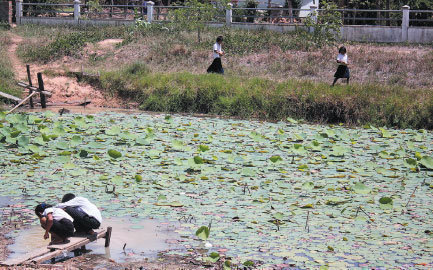
How BioSand water filters work
This Canadian-made technology uses large tanks and a unique combination of slow sand and biological filtration to quickly transform contaminated water into clean water. Here’s how the school filter works:
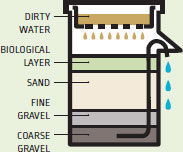 ILLUSTRATION: JANICE VAN ECK
ILLUSTRATION: JANICE VAN ECK
A school collects dirty water in a reservoir tank, which slowly releases the water into an adjacent filtration tank. Fine sand and a biological layer of water in the filtration tank trap and consume disease-causing parasites, micro-organisms and viruses. More filtration occurs as the water continues to travel downward through increasingly coarse layers of sand and gravel where organisms die off without light and oxygen. The gravitational force of the unfiltered water above pushes the filtered water through a pipe and into a large storage tank for drinking and washing. –WWW.SAMARITANSPURSE.CA
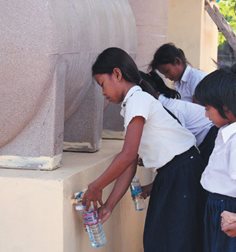
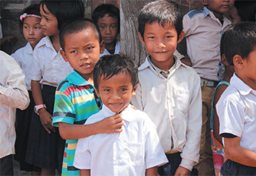
Left: Filling up water bottles in the schoolyard. PHOTO: KAREN STILLER
Right: The schoolchildren were very happy to meet visitors from Canada.PHOTO: KAREN STILLER
Water to a home
Hgon Sream and Heourch Amtho are a young couple in their 20s who live in a wooden house raised on stilts. The stilts protect their home from flooding and provide an open space underneath perfect for meeting and storage.
Today, it’s for receiving their new BioSand filter.
Their three-year-old daughter Hgon cries much of the visit, probably because she woke up from her peaceful nap on a gently swaying hammock to a group of eager Canadians grinning at her.
We have arrived, sweaty and dirty, from the BioSand filter assembly site just down the rutted dirt road. There we oiled molds, assembled the housing for the filters – Emma Smith, a 19-year-old psychology student, and I first confirmed with each other which was a nut and which a bolt – and lugged bucket after bucket from wheelbarrow to filter, filling the interior chambers of the filters with the thick oatmeal-like mixture of fresh cement.
It is possible to construct 20 BioSand filters a day, and the estimate is that 1,900 will be installed in this province of Cambodia this year.
This family signed up after a visit from a Samaritan’s Purse water intern whose job is to convince them and their neighbours that water made 99 per cent clean is better for their health and their daughter than the water they have been carrying home from a nearby pond.
They would have paid $5 or donated a day’s work to water filter construction to pay for this filter. Buy-in is essential to success.
Part of the deal is hygiene and sanitation training as well. This family doesn’t have a latrine yet – they sheepishly admit they still go across the road to the edge of the field to use the washroom – but that will be the next step.
Neighbours watch as the filter is assembled. Samaritan’s Purse hopes this family will become thought leaders in the community. If a family sees another with easy access to clean water and all the ensuing health benefits, they might want one too.
The difference between the water being poured in and the water pouring out is startling. From beige and murky to clear and sparkling. From night into day.
Some answers
Vichet Mongkul is the Cambodian co-ordinator of our Water for Kids team. He hustles us on and off our bus, answers the same questions over and over again, helps build water filters, gamely joins in on loud travelling games, and translates and teaches us about the country he loves.
"Of course, we need donations," says Mongkul. "We really appreciate what you donate to us. But we want you to see the impact." He is pragmatic. "I believe that you coming here will give you more encouragement to give more. Coming to Cambodia will give you the big picture. We want you to see how we can impact people to sustain what they have for generations."
I have been on enough short-term trips to know I will benefit from this experience. I will spend less money on stupid things, at least for a while. I will put beautiful pictures in frames and hang at least one on our travel wall. I will tell funny stories for as long as there is an audience (not very long, actually). Some people who haven’t done this kind of thing will think our team is quite something. They won’t fully know that we received as much, if not more, than we gave, even if that wasn’t our intention.
And I will be re-energized in my faith because I am worshipping with brothers and sisters who have so much less, and so much more.
I confess this to Mongkul. He already knows.
"Some people just want to do something good because they have leftovers and they are Christian," he says. "And while your gift is highly appreciated and we believe this is a blessing for us that will help us bring revival, we want to share this revival back to you. If you give to us, you bless us financially. We want to bless you spiritually. Let’s share the blessing."
Complicated blessings
Another day, Emma Smith and I, with our soft, pale hands of student and writer, are given the job of continuing the waterline trench another part of the team began earlier in the week at one of the schools. We pick up two shovels and trudge our way over to where the digging ends – and the densely packed mound of sand and gravel surrounding the water reservoir begins.
We have been told to dig through this hill. It simply needs to be a trench through the hill wide enough for a person to stand in it.
In the history of mission trips all over the world, never have two people been more badly matched to a task. She starts to dig up high. I dig down low.
We have no idea what we are doing. We both know this.
Plus, it feels like we are on a much hotter planet, Venus maybe. But who wants to be the team complainers? Not us!
Quickly, we no longer care about that. We holler over for someone to come and explain the part we are missing. Isn’t there a bulldozer? Twenty-eight-year-old Chad Morgan, a team member who works like the Energizer Bunny, comes running and attacks the small indentation we have made in the hill with a hoe. Now we have loose stuff we can shovel out.
We use this up quickly. We’re no longer talking to each other. It’s too hot. I have a crust made of dirt and sweat, with an inner bonfire burning. We give up. This is a hill I will not die on.
We pick up Dawn Graburn, our Canadian team leader, already heat exhausted under the scraggliest tree I have ever seen and make our way slowly back to camp. We lie down flat on a tarp under a canopy roof striped like a carnival tent set up to shelter the men’s tents. We cool. We chat. It is good.
Later I pour a double effort into the sheep mask craft with the kids who come for our after school program, trying to redeem myself.
And at night, in my mosquito netting tent-shelter, I flip open my iPad and read my Bible. I’m working my way through 1 Corinthians, a chapter a night, if I can stay awake long enough. The relentless heat and the crowing roosters stomping around all the livelong night, combined with our cooks cutting, slicing, dicing and pounding by 3 a.m. mean sleep is in short, blessed spurts. You grab it when you feel it coming and hold on for dear life.
In my tent each night, I also tear open a foil sample of very good skin care. I gather these silvery packets from drugstores and magazines throughout the year and use them as a treat when I am away from home. I realize I am trying to maximize spiritual growth while minimizing skin damage, and I feel a little awkward.
In the end
Near the end of our trip, we visit a school where Samaritan’s Purse installed a water filter the year before. They want us to see a filter fully in use, to understand better what we have been part of this week.
Kids run around the playground laughing and playing and careening and bouncing off each other like kids do. And filling up their bottles with fresh, clean, safe water whenever they want. They even splash in it. Here, there is abundance.
A spontaneous soccer game breaks out, as it almost always does, between some members of our team and some of the kids.
Others of us, wilted and withered by the intense heat, sit at a long picnic table in one of the only spots of shade. School staff bring out coconuts. They lop off the tops, jab straws in and hand them out.
And it turns out that coconut works wonders. I guess that’s why it grows where it is very hot. I feel myself plump up, fill out, sit up straight. I am a dry plant watered well. I listen to the kids run and yell and laugh. And I am so happy I am here – a small part of this wonderful thing unfolding.
The team reflects
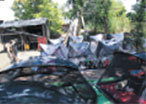 "There
"There 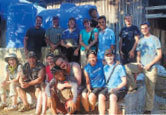 were lots of great memories about this trip. Pouring concrete into the filter frames in the incredible heat. Trying to fall asleep in the mosquito tent with sweat running off the body in buckets. Jayden crashing through the bus floor, breaking his seat because our driver hit a bump." –Bernie Thiessen, New Sarepta, Alta.
were lots of great memories about this trip. Pouring concrete into the filter frames in the incredible heat. Trying to fall asleep in the mosquito tent with sweat running off the body in buckets. Jayden crashing through the bus floor, breaking his seat because our driver hit a bump." –Bernie Thiessen, New Sarepta, Alta.
"I never expected to be with a group of people who could share personal stories, interact equally with each other, and laugh as much as we did." –Emma Smith, Toronto
"My best memory is visiting the school where the BioSand water filter had been installed and in use for a while. It brought me to tears watching one little girl giggle as the water splashed over the top of her cup." —Miriam Cleough, Tatamagouche, N.S.
"Seeing the contrast between the source of that water – a dirty pond – and the filtered water itself, and knowing those kids were getting safe water that would keep them healthy made all the sweat, work and discomfort totally worth it!" –Jeff Adams, Samaritan’s Purse, Calgary
Karen Stiller of Port Perry, Ont., is a senior editor at Faith Today.